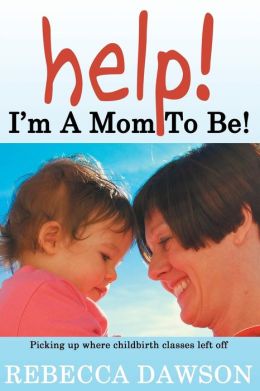Watching my family member's awful struggle against postpartum depression was excruciating. At the time, I knew little about this disorder, but I knew soon enough that I wanted to avoid it. As I muddled through that season with her, possibly making matters worse, I kept thinking, “What is this?” and, “How do I avoid it?”
And so began my frantic search to gather information about motherhood and postpartum depression (PPD). What I couldn’t find was an honest, fun-loving approach to the material that both grappled with tough questions and offered a helpful Christian perspective. That became the catalyst for my book, Help! I'm a Mom To Be!: Picking Up Where Childbirth Classes Left Off, which is designed as a preventive tool to ward off postpartum depression.
Postpartum depression is classified as a mood disorder largely due to the hormonal changes occurring within the body. This disorder has three varying degrees: baby blues, postpartum depression, and postpartum psychosis.
Research suggests that while 20 percent of all women experience some form of prenatal depression, postpartum blues affect 50-80 percent of all new moms, and 1 in 5 women with postpartum blues go on to develop postpartum major depression. In a recent article on postpartum depression, The Wall Street Journal pointed out that “trying to ‘nip this in the bud or prevent’ (postpartum) depression is key.”
Motherhood hopefully brings with it the gift of joy. But, when it does not, moms are often left with the devastating feelings of being all alone and overwhelmed. Countless hours are spent during pregnancy examining how-to books on anything touching on childbirth and child-rearing. But little to no time is spent reflecting upon the emotional changes that occur from conception through early motherhood, because most women think they will never struggle with this disorder. In most cases, the child is not the problem. Rather, the problem is usually embedded in her life, and now rises to the surface with the addition of a child. A child brings sudden and absolute change. Life is no longer about her as an individual.
If PPD is largely due to changing hormone levels, then how you can prevent something that is hormonal? A great deal of research does point to hormonal and chemical changes within the body. However, recent research reveals that men and women both experience this disorder. Since men do not have the same chemical composition as women, something beyond hormones must play a role.
As a pregnancy help center, you and your staff are in a unique position to empower women with the hope that this disorder can be prevented.
Here are a few symptoms to help a mother-to-be identify this aliment:
- Persistent low mood
- Inadequacy
- Failure
- Hopelessness or helplessness
- Exhaustion
- Emptiness
- Sadness or tearfulness
- Guilt
- Shame
- Worthlessness
- Confusion
- Anxiety or panic
- Fear of harming the baby
- Fear of being alone or going out
- Lack of interest or pleasure in usual activities
- Insomnia
- Excessive sleep or nightmares
- Under- or over-eating
- Agitation
- Decreased energy or motivation
- Withdrawal from social events or contact with other people
- Poor personal hygiene
- Inability to cope with routine tasks
- Inability to think clearly or make decisions
- Lack of concentration or poor memory
- Fear of being rejected by partner
This lengthy list is not meant to intimidate, but to train women to quickly recognize each and every symptom for the purpose of prevention, early detection, and healing. The main distinguishing element for postpartum depression is that it occurs during pregnancy or after the delivery of a child. Postpartum depression can vary from woman to woman, lasting from six months to one year.
Are there ways to prevent and ward off postpartum depression? Start with these preventive methods:
- Help your client create a Support Plan. Identify all the individuals in her life who are able to help once her baby arrives. It may not be necessary to talk to these individuals ahead of time, but knowing beforehand that she has support can be vital.
- Encourage her to talk about her fears and expectations during the client/volunteer sessions. Also suggest the importance of discussing her fears and expectations with her spouse or partner.
- Discuss the framework of her childhood within a session. Ask her questions regarding how she was raised, such as: “What was common at home?” “How were you disciplined?” “Did you feel a sense of love and acceptance?” “What did you like?” “What didn't you like?” Remind her that we all start somewhere, and even if her past was difficult, she can work to change life for her and this child. Work together to compose a plan that will work for her.
- Encourage her to let her weaknesses make her strong. Encourage her to be aware and identify her weaknesses early on. We all have them. Admitting we are unable is often the first step towards emotional healing.
If you find yourself unsure how to help another suffering from PPD, start with:
- Encouragement—Ask what are the best ways you can help. Remind her she is not alone. Many women have felt similarly. After that, help support her through the battle.
- Convince her to seek a medical elevation.
- Pray and remind her there is hope for each new day.
All new moms have to start somewhere. Encourage her to start with what she already knows and then continue to grow. Help her enjoy this baby by offering preventive measures to treat postpartum depression.
Rebecca Dawson is the author of "Help! I'm a Mom-To-Be!" She is a Master's level counselor, former adjunct Graduate Professor for the Grace College Counseling Department, a former Manager of Client Services at her local Pregnancy Center, and the mother of three wonderful little boys. Her new book titled, "Stamped on Every Child's Heart" addresses Childhood Disorders and will be released this Spring. In addition, Blue Room Publications also offers the "Help! I'm a Mom-To-Be!" Training Manual which assists Pregnancy Centers in facilitating groups and individual sessions. Rebecca can be contacted at This email address is being protected from spambots. You need JavaScript enabled to view it. Look for "Help! I'm a Mom-To-Be!" online at Barnes and Nobles and at www.blueroompublications.com.
References
1. Dawson, Rebecca, M.A. "Help! I'm a Mom To Be!" Blue Room Publications and Production. © 2010, pgs. 67-69.
2. Kahn, David A., M.D., Margaret L. Moline, Ph.D., Ruth W. Ross, M.A., Lee S. Cohen, M.D., and Lori L. Altshuler, M.D. A Postgraduate Medicine Special Report- Major Depression During Conception and Pregnancy: A Guide for Patients and Families. March 2001, pg. 110-111.
3. Moline, Margaret L., Ph.D., David A. Kahn, M. D., Ruth W. Ross, M.A., Lori L. Altshuler, M.D., Lee S. Cohen, M.D., A Postgraduate Medicine Special Report- Postpartum Depression: A Guide for Patients and Families. March 2001, pgs. 112-113.
4. Wang, Shirley S. New Dads, Too, Can Suffer Depression. The Wall Street Journal (WSI.com). 19 May 2010.
5. KidsHealth. “Postpartum Depression and Caring for Your Baby.” © 1995-2009. The Nemours Foundation/KidsHealth®. Reprinted with permission.
6. “Depression During Pregnancy.” BabyCenter, L.L.C. 1997. http://www.babycenter.com/0depression-during-pregnancy9179.bc


